弟子规双语版
弟子规的中英文版
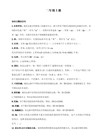
财物轻 怨何生 言语忍 忿自泯
或饮食 或坐走 长者先 幼者后
长呼人 即代叫 人不在 己即到
称尊长 勿呼名 对尊长 勿见能
路遇长 疾趋揖 长无言 退恭立
骑下马 乘下车 过犹待 百步余
长者立 幼勿坐 长者坐 命乃坐
尊长前 声要低 低不闻 却非宜
进必趋 退必迟 问起对 视勿移
If you hoard up the best for yourself, kinfolk’s feelings are sure to be hurt.
解:东西虽小,也不要私自隐藏,如果父母知道你隐藏一些东西,一定会很伤心。
亲所好 力为具 亲所恶 谨为去
Whatever your parents enjoy, do all you can to provide.
唯德学 唯才艺 不如人 当自砺
若衣服 若饮食 不如人 勿生戚
闻过怒 闻誉乐 损友来 益友却
闻誉恐 闻过欣 直谅士 渐相亲
无心非 名为错 有心非 名为恶
过能改 归于无 倘掩饰 增一辜
泛 爱 众
凡是人 皆须爱 天同覆 地同载
行高者 名自高 人所重 非貌高
才大者 望自大 人所服 非言大
祖宗虽远,祭祀不可不诚。子孙虽愚,经书不可不读。废经废伦,治安败坏根由。贪瞋痴慢,人心堕落原因,欲致天下太平,须从根本着手。图挽犯罪狂澜,唯有明伦教孝。误根本为枝末,认枝末为根本。为求解决问题,反倒制造问题。君子唯有务本,本务邦国自宁。 俗云:「教儿初孩,教妇初来」,儿童天性未染污前,善言易入;先入为主,及其长而不易变;故人之善心、信心,须在幼小时培养;凡为人父母者,在其子女幼小时,即当教以读诵经典,以培养其根本智慧及定力;更晓以因果报应之理,敦伦尽分之道;若幼小时不教,待其长大,则习性已成,无能为力矣!
弟子规双语版

弟子规The Rules for Being a Student总叙Preface Outline弟子规。
圣人训。
首孝弟。
次谨信。
泛爱众。
而亲仁。
有余力。
则学文。
These are the rules for being a studentHanded down to us by Ancient Sages.First be filial to your own parents and respectful and loving to our siblings Be cautious and trustworthy.Love all equallyClose to and learn from People with moral virtues and compassion.Whatever time you have leftShould be devoted to learning.Only when we have accomplished all the abovecan we then study further and learn literature and art to improve the quality of our cultural and spiritual lives.第一章入则孝Chapter 1 On Being Filial at Home父母呼。
应勿缓。
When your parents are callingAnswer them right away.父母命。
行勿懒。
When your parents ask you to do somethingDo not be lazy --- Do it quickly.父母教。
须敬听。
When your parents instruct youListen with patient respect.父母责。
须顺承。
《弟子规》中英文对照

弟子规(英文文字版)第一章:开宗明义章Chapter Principle And Explaining the Meaning弟子规,圣人训。
首孝悌,次谨信。
泛爱众,而亲仁。
有余力,则学文。
弟子规,圣人训。
这套为人子弟的规矩,是根据古代圣人的遗言编成的。
The rules for being a student are instructions given by sages.首孝悌,次谨信。
首先要孝顺父母,尊敬兄长,其次要言行谨慎而有信用。
Of all rules, the first is respect, for your parents and all of your elders, learn to be careful andtrustworthy.泛爱众,而亲仁。
要博爱众生,并且亲近仁者。
Be friendly and kind to all, draw near to people who are good.有余力,则学文。
假如以上都能努力去实行,还有更多的能力,就应该研究学问。
Whatever time you have left should be devoted to learning.第二章:孝Chapter Two: Filial Piety父母呼,应勿缓,父母命,行勿懒。
父母教,须敬听,父母责,须顺承。
冬则温,夏则凊,晨则省,昏则定。
出必告,反必面,居有常,业无变。
事虽小,勿擅为,苟擅为,子道亏。
物虽小,勿私藏,苟私藏,亲心伤。
亲所好,力为具,亲所恶,谨为去。
身有伤,贻亲忧,德有伤,贻亲羞。
亲爱我,孝何难,亲憎我,孝方贤。
亲有过,谏使更,怡吾色,柔吾声。
谏不入,悦复谏,号泣随,挞无怨。
亲有疾,药先尝,昼夜侍,不离床。
丧三年,常悲咽,居处变,酒肉绝。
丧尽礼,祭尽诚,事死者,如事生。
父母呼,应勿缓,父母呼唤我们时,马上回答,不要迟缓。
When father and mother are calling, answer them right away.父母命,行勿懒。
弟子规英文版

弟子规英文版Standards for Being a Good Student and Child Di Zi GuiStandards for Being a Good Student and Child CONTENTSIntroductionOutlineChapter 1:At Home, Be Dutiful to Y our ParentsChapter 2:Standards for a Y ounger Brother When Away from Home Chapter 3:Be Cautious in Y our Daily LifeChapter 4:Be TrustworthyChapter 5:Love All EquallyChapter 6:Be Close to and Learn from People of V irtue and Compassion Chapter 7:After All the Above Are Accomplished, Study Further and Learn Literature and Art to Improve Y our Cultural andSpiritual LifeINTRODUCTIONMany of you will probably wonder what this book is all about. What is in this book that made it so important in ancient China? Can it still be relevant today? If we teach this book today, what can it do for us and what kind of influence will it have on our present society?Di Zi Gui, in English, means standards for being a good student and child. It is an ancient Chinese book handed down to us from ancient Chinese Saints and sages. The source for the outline of this book was selected from Analects of Confucius, Book 1, Chapter 6, where Confucius said:”A good student and child must first learn to be dutiful to his parents, and be respectful and loving to his siblings. Next he must be cautious with all people, matters and things in his daily life, and be a trustworthy person. He must believe in the teachings of the ancient saints and sages and put their teachings into practice. Then he must learn to love all equally and be close to and learn from people of virtue and compassion. Only after all the above duties have been accomplished, if he has the time and energy, he should then further study and learn literature and art to improve the quality of his cultural and spiritual life.”Since the main outline of this book is based on the teachings of Confucius, let us find out who he is. Confucius was a great Chinese scholar, teacher and educator. He was born in China about twenty-five hundred years ago, about the same time that Shakyamuni Buddha was born in India. Confucius deeply influenced Chinese culture, and this influence extends throughout the world even today. He believed that moral principles, virtues, and discipline should be the very first lessons to be taught to a child, and that a child needs to practice them daily. Unlike modern day parents who disapprove of physical punishment, ancient Chinese parents actually encouraged and thanked the teacher when their children were punished for misbehaving. It was most important to ancient Chinese parents that their children learned the moral principles and virtues first, before any other subject, because without moral principles and virtues as a foundation, the learning of all other subjects would be futile. The sequence of ancient Chinese educational system based on the Confucian teachings is as follows: First a child learns the subject on Virtues, after which he studies Language, then Methods in Dealing with People, Matters and Things, and lastly Literature and Art. We need to understand that Confucius and Shakyamuni Buddha shared almost the same principles and teaching methods. They both taught us that being dutiful to one’s parents and being respectful to one’s teachers are the basis of a person’s good virtues. If we can appreciate the fact that the study of Virtues was a child’s first subject in school, then we will realize how important it was for a child to be dutiful to his or her parents at home.If you ask a student who follows Confucian teachings whether he or she can explain in a short sentence what Confucian teachings are all about, the student will tell you this: The principles of Confucian teachings make it a person’s duty to strive to be fully enlightened, to practice universal love and to be a perfectly good person. This is the summation of Confucian beliefs. For a person to practice universal love, he or she must begin at home, and learn to be a dutiful child and a loving sibling. If you ask a follower of Shakyamuni Buddha whether he or she can explain Buddha’s teachings in one sentence, you will get the following reply: Shakyamuni Buddha’s forty-nine years of teaching never deviated from the principle that a person has to be dutiful to his or her parents, and be respectful and be of service to his or her teachers. This person must be all loving and must not kill any living beings. He or she must be a fervent practitioner of the ten good conducts. Therefore, both Confucius and Shakyamuni Buddha shared the same beliefs and felt that following these principles are our only duties here on earth.The important duties stated in Analects of Confucius were used as chapters in this book. Altogether there are seven chapters, with each chapter listing one duty. They are presented in sequence according to the ancient Chinese educational system. The original text written in classical Chinese is in the form of verses that can be easily recited and memorized by young Chinese students.The contents of this book were actually compiled and edited over aperiod stretching thousand of years; it contains the recommended standards of being a good student and child. The outline starts out by telling us that those standards were taught by Confucius, Mencius and all the past Chinese saints and sages. They all agreed that those duties are the very basic disciplines a child should learn and practice every day while still young. Even though they seem stringent by today’s standards, it is apparent that the people of that time felt it was important that the child should be well disciplined and taught moral principles and virtues at an early age. They felt that without strict discipline and moral standards, a child would amount to nothing. Without knowing what it meant to be dutiful to one’s teachers, a child would grow up not listening to or respecting anyone. Such a child would become a person without virtues. At that time,”a person without virtue”was not qualified to serve in the imperial court, thereby depriving that person the opportunity to serve his country and his people.Ironically today, the educational system is just the opposite. Many parents listen to the child instead of the other way around. Additionally, teachers are afraid to teach and discipline children because they are fearful of violating the children’s legal rights, or even being sued by the parents. Currently, we live in a world where the relationships between people, between people and their environment, between parents and children, between husbands and wives, and between employers and employees are disintegrating. Parents no longer act like parents. Children do not act like children. Without proper education our minds become polluted and our family system disintegrates, as evidenced by an ever-increasing divorce rate. Soon planet Earth will no longer be fit for us to live on. Many of us are fearful for our futures and the futures of our children. We hope that by reintroducing this book, it will provide guidance for parents and children. In this way, future generations will benefit from it and our world and society at large will be more at peace, and we will all have a better place to live.As mentioned before, Confucius said:”A good student and child must first learn to be dutiful to his parents, and also be respectful and loving to his siblings.” In accord with the ancient Chinese educational system, this book starts by teaching us how to be a good dutiful child when we are at home, and how to be a respectful and loving sibling when we are away from home, including how to be respectful to our elders. Therefore, these two duties are the headings for the first two chapters. The first chapter is on”Xiao,” which is a Chinese word that means being dutiful to one’s parents. All the ancient saints and sages thought”Xiao”was the most important duty in a person’s life. This chapter teaches children the proper conduct on how to talk to and behave in front of parents, and what their correct attitudes and manners should be.The second chapter states the principle and standard of conduct for the younger sibling towards the older sibling when the younger siblings are away from home. In Chinese, the word ¨Ti,” which means sincere fraternal love, describes the love between siblings. In Buddhism, its meaning extends further to include conduct towards all persons who are older and as the same generation as ourselves. This chapter then further expands this concept towards our elders. It teaches us how to show respect to the elders and what our correct attitudes and manners should be.Even though in this book there is no separate chapter on the standard of conduct towards our teachers, it is understood that all the principles and standards taught in this book should also be applied to our teachers.The third chapter teaches us how we should be cautious in whatever we do daily, whether we are interacting with people, matters or things. The fourth chapter teaches us how to be a trustworthy person. It teaches us that we need to be cautious in the language we use, in our behavior, and in our thoughts. We must also believe in the teachings of the saints and sages. A saint is a person who truly and thoroughly understands the facts about life, and about this universe. In China we call them saints. In India, people call them Buddhas. In western culture people call him God. Actually we are all talking about the same thing. All their teachings come from hearts that were true and pure. They have all seen the truth and this truth will never change with time. Therefore, no matter who they are as long as they are saints, Buddhas or God, they speak the same truth and if it is the truth,The fifth chapter tells us that a person must love all equally. The love it talks about is universal love, not worldly love. It teaches us that as human beings we should have compassion for all people. To be a person of compassion, we must first start by being filial children: respecting our parents and by loving our siblings. Then we should learn how to expand this love and respect to include all who are parents and siblings. Eventually we will learn to love all people equally. The sixth chapter teaches us to be close to and learn from people of virtue and compassion. There is an old Chinese saying that a person with virtue and compassion has no enemies. ”Xiao”and”Ti” have been the very foundation of Chinese culture for five thousand years. Those two qualities separate a person from an animal. ”Xiao”and”Ti” are the minimum requirements for being a human, while compassion and virtue are the highest standards set by Confucius for being a human. For us to reach the highest standards, we must first fulfill our duties to our parents. But where can we find these people who are truly compassionate and virtuous so that we can be close to them and learn from them? The world today is in great turmoil. It would be a difficult task if not impossible to find even one person. If we cannot find that person, the next best thing is to follow the teachings of saints and sages from the past and learn from them. If we belong to a religious group, we can always follow the teachings of our religion. We can select from any one of the groups just mentioned and just follow the respective teachings to be our guide in this life.The seventh chapter tells us that after we have accomplished all the above duties, we should further study literature and art to improve our cultural and spiritual life. Confucius set a standard for us as to what kind of books we should read and what kind of books we should avoid. The kind of books we should read had to have a positive effect on us. Any book that causes a negative impact should always be avoided. Confucius expected every one of his students to be a balanced person, whose inner qualities, like a person’s virtues and integrity, had to match that of outside, which were developed from the study of literature and art. Only then will this person become a truly refined According to Shakyamuni Buddha, we are currently living in the Dharma Ending Age. In this period, people will be constantly fighting each other. Today, endless conflicts are taking place everyday. Our current society is the result of our educational system, which has already been proven to be a great failure. The educational system of today only promotes teachings that lead our young people to a world of competition, which will eventually turn them into hell-beings, hungry ghosts and animals. When we lose our moral standards, and search instead for money and fame, we leave the world of humans and heavenly beings, and degenerate into a lower form of being. Therefore, education that is based on moral principles is extremely important for our world today. This is the only way we can help our young discover their true self-nature, which is supposed to be all knowing and virtuous. All the ancient saints and sages recommended that the first step we must take is to start communicating and working with family members at home. That is why both Confucius and Shakyamuni Buddha said:”Our virtues are based and build on the foundation of being dutiful children to our parents.” This book, Di Zi Gui, helps our children put the teachings of the ancient saints and sages into actual practice, and that is why this book is so important for our educational system today. It is definitely still relevant today, actually even more so.Finally we must add a note here to help us understand these standards. Those standards were used in ancient China, at a time when the society was centered on the male, and when only the male child was allowed to enter a school. Therefore, all the pronouns used in the translation are of the male gender. For today’s society, it applies to all children, both male and female.Di Zi GuiStandards for Being a Good Student and ChildOUTLINE(1)”Standards for Being a Good Student and Child”[1]was taught by Chinese saints and sages of the ancient past.First, it teaches you how to be dutiful to your parents, and to be respectful and loving to your siblings. [2]Then it teaches you how to be cautious with all people, matters, and things in your daily life, and to be a trustworthy person, to believe in the teachings of the ancient saints and sages.[3]Furthermore, it teaches you to love all equally, be close to and learn from people of virtue and compassion.When you have accomplished all the above duties, you can further study and learn literature and art to improve the quality of your cultural and spiritual life.Chapter 1: At home, Be Dutiful to Your Parents(2)When your parents call you, answer them right away. When they command you to do something, do it quickly. When your parents instruct you, listen respectfully. When your parents reproach you, obey and accept their reproach; try hard to change and improve yourself and start anew.(3)In the winter, keep them warm; in the summer, keep them cool. Greet them in the morning to show them that you care. At night be sure that they rest well. Before going out, tell your parents where you are going, as parents are always concerned about their children. After returning home, see your parents to let them know you are back, so they do not worry about you. Have a permanent place to stay and lead a routine life. Persist in whatever you do and do not change your aspirations at will.(4)Although a matter may be considered trivial, but if it is wrong to do it or unfair to the other person, do not do it thinking it will bear little or no consequence.[4]If you do, you are not being a dutiful child because parents do not want to see their child doing things that are irrational or illegal. Even though an object may be small, do not hoard it. If you do, your parents will be heartbroken. [5](5)Whatever pleases your parents is fair and reasonable; try your best to get it for them.[6] Whatever displeases your parents, if within reason,[7]cautiously keep it away from them.When your body is hurt, your parents will be worried. If your virtues[8]are compromised, your parents will feel ashamed. When you have loving parents, it is not difficult to be a dutiful child. If your parents hate and you are still dutiful to them, only then will it meet the standards of the saints and sages for being a dutiful child.(6)When your parents do wrong, urge them to change. Do it with a kind facial expression, and a warm gentle voice. If they do not accept your advice, wait until they are in a happier mood before you dissuade them again, followed by crying to make them understand why. [9] Do not hold a grudge against them if they result to whipping you.(7)When your parents are ill, taste the medicine first beforegiving it to them.[10] T ake care of them night and day; do not leave their bedside. During the first three years of mourning after they passed away, remember them with gratitude and feel sad often for not being able to repay them for their kindness in raising you. During this period you should arrange your home to reflect your grief and sorrow. Avoid festivities and indulgence in food and alcoholic drinks.Observe the proper etiquette[11]in arranging their funerals. Hold the memorial ceremony and commemorate their anniversaries with your utmost sincerity. Serve your departed parents as if they were still alive. [12]Chapter 2: Standards for a Younger Brother WhenAway from Home(8)Older siblings should befriend the younger ones; younger siblings should respect and love the older ones. Siblings who keep harmonious relationships among themselves are being dutiful to their parents.[13]When siblings value their ties more than property and belongings, no resentment will grow among them. When siblings are careful with words and hold back hurtful comments, feelings of anger naturally die out.(9)Whether you are drinking, eating, walking, or sitting, let the elders go first; younger ones should follow. When an elder is asking for someone, get that person for him right away. If you cannot find that person, immediately report back, and instead put yourself at t he elder’s service.(10)When you address an elder, do not call him by his given name[14].This is in accord with ancient Chinese etiquette. In front of an elder, do not show off. If you meet an elder you know on the street, promptly clasp your hands and greet him with a bow. If he does not speak to you, step back and respectfully stand aside. If an elder you know is on foot while you are riding on a horse[15], you should dismount and pay respect to the elder. If you are riding in a carriage, [16] you should stop, get out of the carriage, and ask if you can give him a ride. If you meet an elder passing by, you should stand aside and wait respectfully; do not leave until you can no longer see him.(11)When an elder is standing, do not sit. After an elder sits down, sit only when you are told. Before an elder, speak softly. If your voice is too low and hard to hear, it is not appropriate. When meeting an elder, walk briskly towards him; when leaving, do not exit in haste. When answering a question, look at the person who is asking you the question.(12)Serve your uncles as if you are serving your parents;[17]T reat your cousins as if they are your own siblings.[18]Chapter 3: Be Cautious in Your Daily Life(13)Get up in the morning before your parents; at night, go to bed only after they have gone to sleep. When you realize that time is passing you by and cannot be turned back, and that you are getting older year by year, you will especially treasure the present moment. [19] Wash your face when you get up in the morning, and brush your teeth. After using the toilet, always wash your hands.(14)You must wear your hat straight,[20]and make sure the hooks[21]of your clothes are tied. Make sure socks and shoes are neatly and correctly worn. Place your hat and clothes away in their proper places. Do not carelessly throw your clothes around, for that will get them dirty.(15)It is more important that your clothes are clean, rather than how extravagant they are. When with an elder or people of importance, wear what is suitable for your station. At home, wear clothes according to your family traditions and customs. When it comes to eating and drinking, do not pick and choose your food. Eat only the right amount; do not over eat. You are still too young, do not drink alcohol. When you are drunk, your behavior will turn ugly.(16)Walk composed, with light and even steps. Stand up straight and tall. Your bows should be deep, with hands held in front and arms rounded. Always pay your respect with reverence.[22]Do not step on doorsills. Do not stand leaning on one leg. Do not sit with your legs apart or sprawled out. Do not rock the lower part of your body while sitting down.(17)Lift the curtain slowly, [23] do not make a sound. Leave yourself room when you turn, make sure you do not bump into a corner.Hold carefully empty containers as if they were full.[24] Enter empty rooms as if they were occupied.[25] Avoid doing things in a hurry, as doing things in haste will lead to many mistakes. Do not be afraid of difficult tasks; do not become careless when a job is too easy. Keep away from rowdy places, and do not ask about things that are abnormal or unusual.(18)When you are about to enter a main entrance, ask if someone is inside. Before entering a room, make yourself heard, so that those inside know someone is approaching. If someone asks who you are, give your name. T o answer”It is me” or” Me” is not clear. Before borrowing things from others, you must ask for permission. If you do not ask, it is stealing. When borrowing things from others, return them promptly. Later on, when you have an urgent need, you will not have a problem borrowing from them again.Chapter 4: Be Trustworthy(19)When you speak, honesty is important. Deceitful words and lies are not allowed. Rather than talking too much, it is better to speak less. Speak the truth, do not twist the facts. Cunning words, foul language, and bad habits must be avoided at all costs.(20)What you have not seen with your own eyes, do not readily tell to others. What you do not know for sure, do not readily pass on to others. When asked to do something that is inappropriate or bad, do not promise lightly. If you do, you will be wrong either way. When speaking, make the words clear and to the point. Do not talk too fast or mumble.Some like to talk about the good points of others, while some like to talk about the faults of others. If it is none of your business, do not get involved.(21)When you see others do good deeds, think about following their example. Even though you are still far behind, you are getting closer. When you see others do wrong, immediately reflect upon yourself. If you have made the same mistake, correct it. If not, be extra cautious not to make the same mistake.(22)When your morals, conduct, knowledge, and skills are not as good as others, you should encourage yourself to be better. If the clothes you wear, and the food you eat and drink are not as good as others, do not be ashamed.(23)If criticism makes you angry and compliments make you happy, bad company will come your way and good friends will shy away. If you are uneasy about compliments andappreciative of criticism, sincere and understanding virtuous people will gradually be close to you.(24)If your mistake is not done on purpose, it is only an error. If it is done on purpose, it is evil. If you correct your mistake and do not repeat it, you no longer have the mistake. If you try to cover it up, you will be doubly wrong.Chapter 5: Love All Equally(25)Human Beings, regardless of nationality, race, or religion, everyone should be loved equally. We are all sheltered by the same sky and we all live on the same planet Earth.(26)A person of high ideals and morals is highly respected. What people value is not based on outside appearance. A person of outstanding ability will naturally have a good reputation. Admiration from others does not come from boasting or praising oneself.(27)If you are a very capable person, use your capabilities for the benefit of others. Other people’s competence should not be slandered. Do not flatter the rich, or despise the poor. Do not ignore old friends, and take delight in new ones. When a person is busy, do no t bother him with matters. When a person’s mind is not at peace, do not bother him with words.(28)If a person has a shortcoming, do not expose it. If a person has a secret, do not tell others. Praising the goodness of others is a good deed in itself. When people approve of and praise you, you should feel encouraged and try even harder. Spreading rumors about the wrongdoings of others is a wrongdoing in itself. When the harm done has reached the extreme, misfortunes will surely follow. When encouraging each other to do good, the virtues of both are built up. If you do not tell others of their faults, you will both be wrong.(29)Whether you take or give, you need to know the difference between the two. It is better to give more and take less. What you ask others to do, ask yourself first if you will do it. If it is not something you will do, do not ask others to do it. You must repay the kindness of others and let go of your resentments. Spend less time holding grudges and more time paying back the kindness of others.(30)When you are directing maids and servants, you should be respectable and dignified. Even though you are respectable and dignified, treat them kindly and generously. If you use your influence to make them submissive, their hearts will not be with you. If you can convince them with sound reasoning, they will then have nothing more to say.Chapter 6: Be Close to and Learn from People ofVirtue and Compassion(31)We are all human, but we are not the same. Most of us are ordinary; only a very few have great virtues and high moral principles. A truly virtuous person is greatly respected by others. He will not be afraid to speak the truth and he will not fawn on others. If you are close to and learn from people of great virtue and compassion, you will benefit immensely. Your virtues will grow daily and your wrongdoings will lessen day by day. If you are not close to and learn from people of great virtue, you will suffer a great loss. People without virtue will get close to you and nothing you do will succeed.Chapter 7: After All the Above Are Accomplished, Further Study and Learn Literature and Art to Improve Your Cultural and Spiritual Life(32)If you do not actively make use of what you have learned but continue to study on the surface, your knowledge is increasing but it is only superficial. What kind of person will you be? If you do apply your knowledge diligently, but stop studying,you will only do things based on your own opinion, thinking it iscorrect. In fact, what you know is not the truth.(33)There are ways to study correctly. They involve concentration in three areas: your mind, your eyes, and your mouth. T o believe in what you read is equally important. When you begin to read a book, do not think about another. If you have not completed the book, do not start another. Give yourself lots of time to study, and study hard. Given time and effort,[26]you will thoroughly understand. If you have a question, make a note of it. Ask the person who has the knowledge for the right answer.(34)Keep your room neat, walls uncluttered and clean, your desk tidy and your brush [27] and inkstone [28] properly placed. If your ink block[29]is ground tilted to one side, it shows you have a poor state of mind. When words are written carelessly, showing no respect, it shows your state of mind has not been well.The books[30]should be classified, placed on the book shelves, and in their proper places. After you finish reading a book, put it back in its right place. Even though you are in a hurry neatly roll up and bind the open bamboo scroll you were reading. Any missing or damaged pages are to be repaired. If it is not a book on the teachings of the saints and sages, it should be discarded and not even be looked at. These other books can block your intelligence and wisdom, and will undermine your aspiration and sense of direction.Neither be harsh on yourself, nor give up on yourself.T o be a person of high ideals, moral standards and virtue is something we can all become in time.(End) Footnotes:1.Select from Analects of Confucius, Book⒐, Chapter 6. It wastaught by Confucius, Mencius, and other Chinese saints and sages of the ancient past.2.”Xiao”and” Ti” have been the very foundation of Chinese culturefor five thousand years. Xiao”У”means to be dutiful to one’s parents with affection, and to understand the basic relationship of grandparents, parents and self. In ideogram form, xiao has two components- the top part of xiao is the top portion of the word elder ”ρ” and the bottom part is the word son”.” Combined, itimplies that the older generation and the younger generation are one: that there should be no gap between them. In Buddhism, the meaning is further extended. Outside the family, the childshould treat every male and female of the parents’ generation as if they were the child’s own father and mother. ”Ti”means sincere fraternal love. Here it is used more as the principle and standard of conduct of the younger brother towards his older brother when the younger brother is away from home. In Buddhism, itsmeaning also extends further to include conduct towards all older persons of any one generation.3.”To believe in the teachings of the ancient saints and sages”means to actually practice and put the teachings of the ancient saints and sages into effect.4.For example, in Buddhism, it is considered breaking the precept ofnot stealing if you borrow a piece of paper or take someone’s pen without permission. It is considered breaking the precept of not killing if you kill an ant or mosquito. If you lie or talk aboutsomeone behind his back, you have broken the precept of notlying, etc.5.Your parents will be saddened by your actions, because if theirchild behaves in such a way when he is still young, then he will probably twist the law in order to obtain bribes and be a curse to his country and his people when he grows up.。
弟子规英文对照版

《弟子规》英文对照版弟子规(STANDARDS FOR STUDENTS)(清)李毓秀撰《弟子规》,清代康熙时山西绛州人李毓秀所作。
李毓秀,字子潜,主要活动是教书。
根据传统对童蒙的要求,也结合他自己的教书实践,写成了《弟子规》。
全书以《论语·学而》中的“弟子入则孝,出则弟,谨而信,泛爱众,而亲仁。
行有余力,则以学文”开篇,对儿童言语行动提出要求,教以应该怎样待人处世,通常的核心思想是孝悌仁爱。
<总叙> Preface Outline弟子规圣人训首孝悌次谨信These standards for students are guidelines, handed down to us by Ancient Stages.First, obey and care for your parents, and then practice true brotherhood.泛爱众而亲仁有余力则学文Learn to be careful and honest, and cherish all living beings.Draw near to good-hearted people, and study whenever you can.解:首先,在日常生活中要做到孝敬父母,友爱兄弟姐妹,其次一切言行中,要谨慎,要讲信用;和大众交往时要平等仁和,要时常亲近有仁德的人,向他学习。
以上这些事是学习的根本,非做不可。
如果做了还有余暇,更应努力地学习礼、乐、射、御、书、术等六艺,各种经典,以及其他有益的学问。
第一章孝(On Being Filial At Home)父母呼应勿缓父母命行勿懒When mother and father are calling, answer them right away.When they give you instructions, obey them without hesitation.解:父母呼唤的时候,要立刻答应;父母要你做事的时候,要马上去做,不要偷懒。
弟子规英文对照版
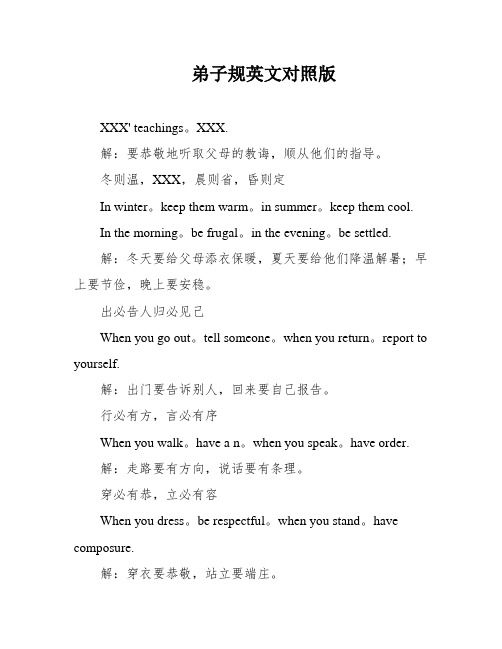
弟子规英文对照版XXX' teachings。
XXX.解:要恭敬地听取父母的教诲,顺从他们的指导。
冬则温,XXX,晨则省,昏则定In winter。
keep them warm。
in summer。
keep them cool.In the morning。
be frugal。
in the evening。
be settled.解:冬天要给父母添衣保暖,夏天要给他们降温解暑;早上要节俭,晚上要安稳。
出必告人归必见己When you go out。
tell someone。
when you return。
report to yourself.解:出门要告诉别人,回来要自己报告。
行必有方,言必有序When you walk。
have a n。
when you speak。
have order.解:走路要有方向,说话要有条理。
穿必有恭,立必有容When you dress。
be respectful。
when you stand。
have composure.解:穿衣要恭敬,站立要端庄。
扫、拂、治、饭,事事要亲力Sweep。
dust。
clean。
cook - do everything with your own hands.解:打扫、拂尘、整理、做饭,要亲手去做。
Do your best to XXX’ likes。
XXX解:尽力满足父母的喜好,小心避免触及他们的忌讳。
言语有权勿轻发恶语伤人心XXX。
XXX’ feelings。
解:言语具有强大的力量,不要轻率地说话,伤害他人的感情。
有则改勿忘过过则勉再努力If you make a mistake。
correct it and don’t et it。
If you’ve done well。
strive to do even better。
解:犯错要及时改正,不要忘记错误。
做好了一件事,要努力再接再厉。
When your parents are ill。
《弟子规》(谨篇)——中英文双语含释义
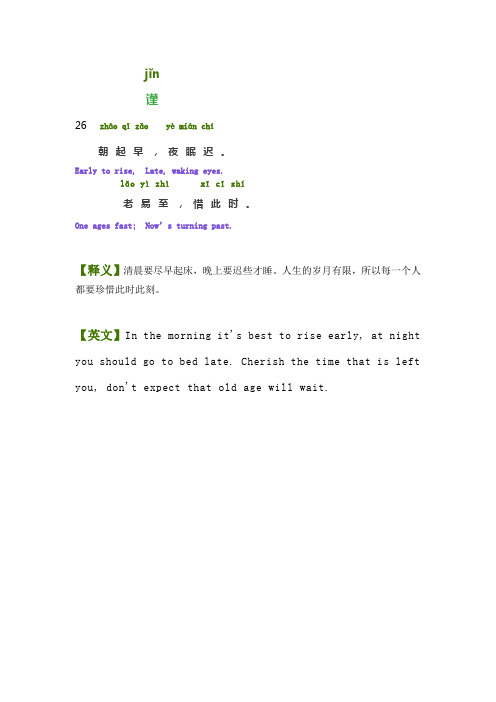
jǐn谨26zhāo qǐ zǎo yè mián chí朝起早,夜眠迟。
Early to rise, Late, waking eyes.lǎo yì zhìxī cǐ shí老易至,惜此时。
One ages fast; Now’s turning past.【释义】清晨要尽早起床,晚上要迟些才睡。
人生的岁月有限,所以每一个人都要珍惜此时此刻。
【英文】In the morning it's best to rise early, at night you should go to bed late. Cherish the time that is left you, don't expect that old age will wait.谨27chén bì guàn jiān shù kǒu晨必盥,兼漱口。
A morning bath, A cleaned mouth.biàn niào huí zhé jìng shǒu便尿回,辄净手。
At th’ toilet stand,Wash your hand.【释义】早晨一定要洗脸漱口。
大小便完后,要洗手。
【英文】First wash your face after rising, and next brush your teeth very well. After you go to the toilet, use water and soap on your hands.谨28guān bì zhèng niǔ bì jié冠必正,纽必结。
Being capped right,And buttoned tight.wà yǔ lǚ jù jǐn qiè袜与履,俱紧切。
双语弟子规
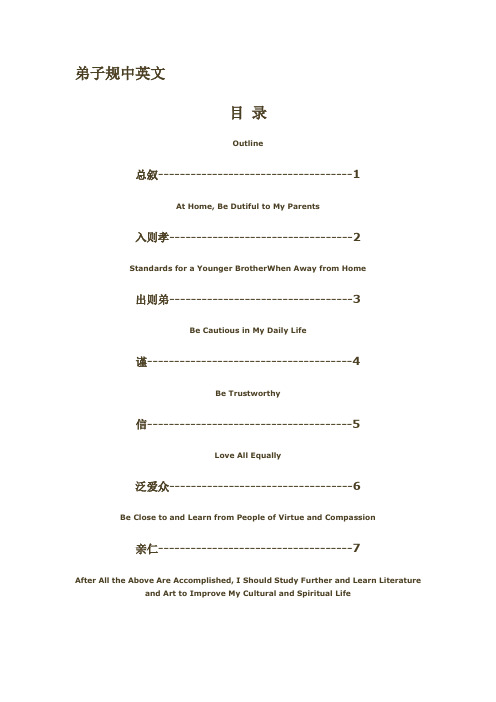
弟子规中英文目录Outline总叙------------------------------------1At Home, Be Dutiful to My Parents入则孝----------------------------------2Standards for a Younger BrotherWhen Away from Home出则弟----------------------------------3Be Cautious in My Daily Life谨--------------------------------------4Be Trustworthy信--------------------------------------5Love All Equally泛爱众----------------------------------6Be Close to and Learn from People of Virtue and Compassion亲仁------------------------------------7After All the Above Are Accomplished, I Should Study Further and Learn Literature and Art to Improve My Cultural and Spiritual Life余力文学--------------------------------8总叙Outlinedìzǐguī shèngrénxùn shǒuxiàotì cìjǐnxìn弟子规圣人训首孝弟次谨信Di Zi Gui or Standards for Being a Good Student and Child33 is a book that was taught by Chinese saints and sages of the ancient past. The book first teaches us how to be dutiful to our parents, and how to be respectful and loving to our siblings.34 It then teaches us how to be cautious with all people, matters, and objects in our daily lives; how to be a trustworthy person;and to believe in the teachings of the ancient saints andsages.35《弟子规》是中国古圣先贤的教诲。
弟子规(中英文对照)
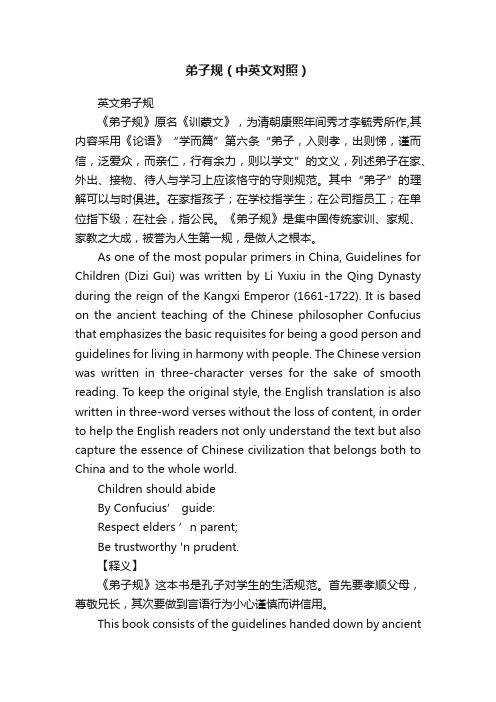
弟子规(中英文对照)英文弟子规《弟子规》原名《训蒙文》,为清朝康熙年间秀才李毓秀所作,其内容采用《论语》“学而篇”第六条“弟子,入则孝,出则悌,谨而信,泛爱众,而亲仁,行有余力,则以学文”的文义,列述弟子在家、外出、接物、待人与学习上应该恪守的守则规范。
其中“弟子”的理解可以与时俱进。
在家指孩子;在学校指学生;在公司指员工;在单位指下级;在社会,指公民。
《弟子规》是集中国传统家训、家规、家教之大成,被誉为人生第一规,是做人之根本。
As one of the most popular primers in China, Guidelines for Children (Dizi Gui) was written by Li Yuxiu in the Qing Dynasty during the reign of the Kangxi Emperor (1661-1722). It is based on the ancient teaching of the Chinese philosopher Confucius that emphasizes the basic requisites for being a good person and guidelines for living in harmony with people. The Chinese version was written in three-character verses for the sake of smooth reading. To keep the original style, the English translation is also written in three-word verses without the loss of content, in order to help the English readers not only understand the text but also capture the essence of Chinese civilization that belongs both to China and to the whole world.Children should abideBy Confucius’ guide:Respect elders ’n parent;Be trustworthy 'n prudent.【释义】《弟子规》这本书是孔子对学生的生活规范。
《弟子规》诗词英译

《弟子规》诗词英译《弟子规》诗词英译父母呼,应勿缓。
父母命,行勿懒。
When your parents call you,You should answer without delay.When your parents ask you to do something,You should act immediately as your parents say.父母教,须敬听。
父母责,须顺承。
When your parents instruct you,You must listen to them respectfully.When your parents rebuke you,You must take their rebukes obediently.冬则温,夏则凊。
晨则省,昏则定。
You should make your parents enjoy warmth in winter,You should let them live in cool in summer.In the morning you should pay your respects to them,In the evening you should arrange them to slumber.出必告,返必面。
居有常,业无变。
Before you leave home, you must tell your parents about your leaving.As soon as you come back (home), you must report to them about your returning home.Your living quarters should be fixedAnd your profession should remain the same.。
《弟子规》(泛爱众篇)——中英文双语含释义
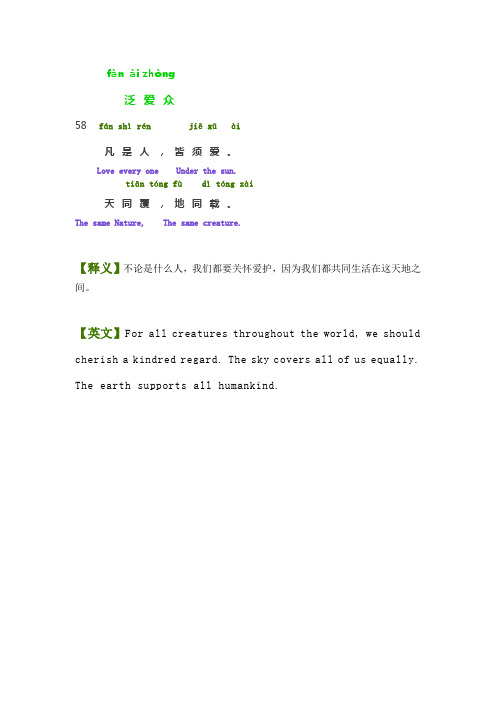
fàn ài zhòng泛爱众58fán shì rén jiē xūài凡是人,皆须爱。
Love every one Under the sun.tiān tóng fù dì tóng zài天同覆,地同载。
The same Nature, The same creature.【释义】不论是什么人,我们都要关怀爱护,因为我们都共同生活在这天地之间。
【英文】For all creatures throughout the world, we should cherish a kindred regard. The sky covers all of us equally. The earth supports all humankind.fàn ài zhòng泛爱众59xìng gāo zhě míng zì gāo行高者,名自高。
A great aim, A good name.rén suǒ zhòng fēi mào gāo人所重,非貌高。
What one seeks, Not good cheeks.【释义】一个品德高尚的人,名声自然高远。
人们所重视的,并不是一个人的相貌。
【英文】People whose conduct is fine are sure to have good reputations. Good conduct is what we respect; Fine looks cannot bring people honor.泛爱众60 cái dà zhěwàng zì dà才大者,望自大。
Great as such, Renowned as much.rén suǒ fúfēi yán dà人所服,非言大。
弟子规(中英文对照)

英文弟子规《弟子规》原名《训蒙文》,为清朝康熙年间秀才李毓秀所作,其内容采用《论语》“学而篇”第六条“弟子,入则孝,出则悌,谨而信,泛爱众,而亲仁,行有余力,则以学文”的文义,列述弟子在家、外出、接物、待人与学习上应该恪守的守则规范。
其中“弟子”的理解可以与时俱进。
在家指孩子;在学校指学生;在公司指员工;在单位指下级;在社会,指公民。
《弟子规》是集中国传统家训、家规、家教之大成,被誉为人生第一规,是做人之根本。
As one of the most popular primers in China, Guidelines for Children (Dizi Gui) was written by Li Yuxiu in the Qing Dynasty during the reign of the Kangxi Emperor (1661-1722). It is based on the ancient teaching of the Chinese philosopher Confucius that emphasizes the basic requisites for being a good person and guidelines for living in harmony with people. The Chinese version was written in three-character verses for the sake of smooth reading. To keep the original style, the English translation is also written in three-word verses without the loss of content, in order to help the English readers not only understand the text but also capture the essence of Chinese civilization that belongs both to China and to the whole world.Children should abideBy Confucius’ guide:Respect elders ’n parent;Be trustworthy 'n prudent.【释义】《弟子规》这本书是孔子对学生的生活规范。
《弟子规》(信篇)——中英文双语含释义
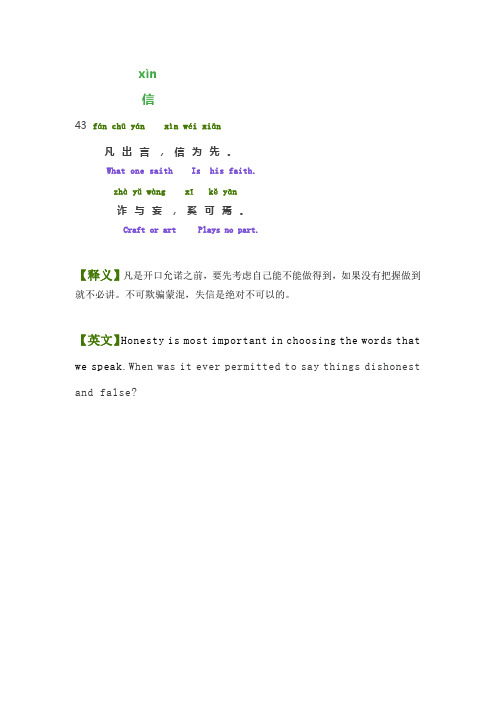
信43 fán chū yán xìn wéi xiān凡出言,信为先。
What one saith Is his faith.zhà yǔ wàng xīkě yān诈与妄,奚可焉。
Craft or art Plays no part.【释义】凡是开口允诺之前,要先考虑自己能不能做得到,如果没有把握做到就不必讲。
不可欺骗蒙混,失信是绝对不可以的。
【英文】Honesty is most important in choosing the words that we speak.When was it ever permitted to say things dishonest and false?信44 huà shuō duō bù rú shǎo话说多,不如少。
wéi qí shìwù nìng qiǎo惟其是,勿佞巧。
【释义】讲话不可太多,言多必失。
话要讲得恰当,要实事求是,不可花言巧语。
【英文】To talk just a little better than to chatter non-stop all day long. Stick to the facts and speak briefly; don't use cunning or flowery words.xìn信45 jiān qiǎo yǔ huì wū cí奸巧语,秽污词。
A glib tongue, An unfaithful one.shì jǐng qì qiè jiè zhī市井气,切戒之。
The worldly dust ,Evade you must.【释义】尖酸刻薄的话,下流的脏话,阿谀奉承之类小市民习气都要避免去沾染。
《弟子规》(亲仁篇)——中英文双语含释义
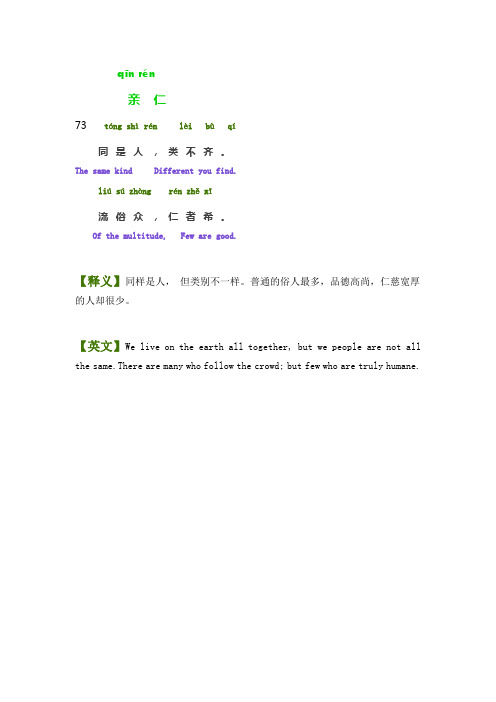
亲仁73tóng shì rén lèi bùqí同是人,类不齐。
The same kind Different you find.liú sú zhòng rén zhě xī流俗众,仁者希。
Of the multitude, Few are good.【释义】同样是人,但类别不一样。
普通的俗人最多,品德高尚,仁慈宽厚的人却很少。
【英文】We live on the earth all together, but we people are not all the same.There are many who follow the crowd; but few who are truly humane.亲仁74guǒ rén zhě rén duō wèi果仁者,人多畏。
Fair who appears May cause fears.yán bú huìsè bú mèi言不讳,色不媚。
A righteous one, He hides none!【释义】真正仁慈的人,大家都会敬畏他,因为他直言不讳,也不阿谀奉承。
【英文】Yet those who are truly humane, intimidate average souls.Because they're direct and outspoken, and because they won't flatter and please.qīn rén亲仁75néng qīn rén wú xiàn hǎo能亲仁,无限好。
Seeking who's kind Is good, unconfined.dérìjìn guò rìshǎo德日进,过日少。
《弟子规》(出则弟篇)——中英文双语含释义
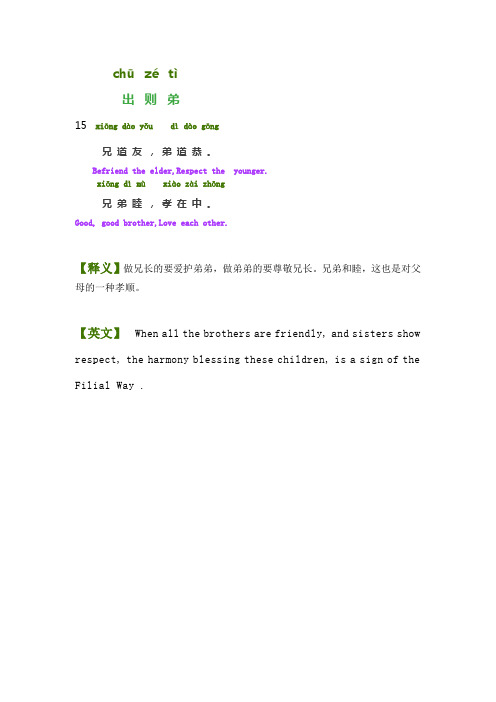
chūzétì出则弟15xiōng dào yǒu dì dào gōng兄道友,弟道恭。
Befriend the elder,Respect the younger.xiōng dì mù xiào zài zhōng兄弟睦,孝在中。
Good, good brother,Love each other.【释义】做兄长的要爱护弟弟,做弟弟的要尊敬兄长。
兄弟和睦,这也是对父母的一种孝顺。
【英文】When all the brothers are friendly, and sisters show respect, the harmony blessing these children, is a sign of the Filial Way .chūzétì出则弟16cái wù qīng yuàn hé shēng财物轻,怨何生。
Properties you despise;No disputes arise.yán yǔ rěn fèn zì mǐn言语忍,忿自泯。
Harshness you restrain;None will complain.【释义】把财物看得轻淡些,兄弟之间就不会相互怨恨,处处忍让、和颜爱语便不会引起忿怒。
【英文】If wealth is not viewed as essential, how could resentment arise? When words are both gentle and patient, bad feelings will soon disappear .出则弟17 huò yǐn shí huò zuò zǒu或饮食,或坐走。
弟子规中英文对照_推荐版
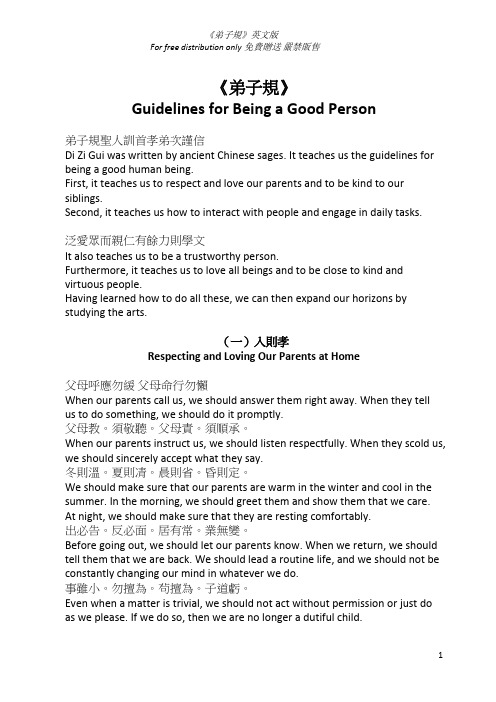
《弟子規》Guidelines for Being a Good Person弟子規聖人訓首孝弟次謹信Di Zi Gui was written by ancient Chinese sages. It teaches us the guidelines for being a good human being.First, it teaches us to respect and love our parents and to be kind to our siblings.Second, it teaches us how to interact with people and engage in daily tasks.泛愛眾而親仁有餘力則學文It also teaches us to be a trustworthy person.Furthermore, it teaches us to love all beings and to be close to kind and virtuous people.Having learned how to do all these, we can then expand our horizons by studying the arts.(一)入則孝Respecting and Loving Our Parents at Home父母呼應勿緩父母命行勿懶When our parents call us, we should answer them right away. When they tell us to do something, we should do it promptly.父母教。
須敬聽。
父母責。
須順承。
When our parents instruct us, we should listen respectfully. When they scold us, we should sincerely accept what they say.冬則溫。
弟子规英文对照版

《弟子规》英文对照版弟子规(STANDARDS FOR STUDENTS)(清)李毓秀撰《弟子规》,清代康熙时山西绛州人李毓秀所作。
李毓秀,字子潜,主要活动是教书。
根据传统对童蒙的要求,也结合他自己的教书实践,写成了《弟子规》。
全书以《论语·学而》中的“弟子入则孝,出则弟,谨而信,泛爱众,而亲仁。
行有余力,则以学文”开篇,对儿童言语行动提出要求,教以应该怎样待人处世,通常的核心思想是孝悌仁爱。
<总叙> Preface Outline弟子规圣人训首孝悌次谨信These standards for students are guidelines, handed down to us by Ancient Stages.First, obey and care for your parents, and then practice true brotherhood. 泛爱众而亲仁有余力则学文Learn to be careful and honest, and cherish all living beings.Draw near to good-hearted people, and study whenever you can.解:首先,在日常生活中要做到孝敬父母,友爱兄弟姐妹,其次一切言行中,要谨慎,要讲信用;和大众交往时要平等仁和,要时常亲近有仁德的人,向他学习。
以上这些事是学习的根本,非做不可。
如果做了还有余暇,更应努力地学习礼、乐、射、御、书、术等六艺,各种经典,以及其他有益的学问。
第一章孝(On Being Filial At Home)父母呼应勿缓父母命行勿懒When mother and father are calling, answer them right away.When they give you instructions, obey them without hesitation.解:父母呼唤的时候,要立刻答应;父母要你做事的时候,要马上去做,不要偷懒。
- 1、下载文档前请自行甄别文档内容的完整性,平台不提供额外的编辑、内容补充、找答案等附加服务。
- 2、"仅部分预览"的文档,不可在线预览部分如存在完整性等问题,可反馈申请退款(可完整预览的文档不适用该条件!)。
- 3、如文档侵犯您的权益,请联系客服反馈,我们会尽快为您处理(人工客服工作时间:9:00-18:30)。
《弟子规》Standards for Students《总叙》Preface弟子规圣人训首孝悌次谨信These are the rules for being a student handed down to us by ancient sages first of all, be filial to your own parents and respectful to all of your elders; be trustworthy and cautious泛爱众而亲仁有余力则学文Be kind and draw near to those who are good. Whatever time you have left should be devoted to learning.《入则孝》On BeingFilial At Home父母呼应勿缓父母命行勿懒父母教须敬听父母责须顺承When your mother or father is calling, don't be slow to respond.When your parents need to instruct you, you should listen with patient respect. Whatever your parents must scold you, accept it with faithful compliance.冬则温夏则凊晨则省昏则定In the winter, make sure they are warm; in the summer, make sure they are cool.In the morning, cheerfully greet them; in the evening, tell them "Good night." 出必告反必面居有常业无变Tell your parents if you plan to go out; report to them when you get back. settle down in one certain place; don't switch from one job to another事虽小勿擅为苟擅为子道亏No matter how small the affair, don't act just as you please.For if you act just as you please, then you haven't performed as you should物虽小勿私藏苟私藏亲心伤 Although a thing may be small, don't save it just for yourself.For if you hoard things for yourself, your parents' hearts will be grieved.亲所好力为具亲所恶谨为去Whatever your parents like best, you should provide for them soon. Whatever your parents dislike, you should do your best to remove.If you carelessly injure your body, your parents will worry and fret.If you heedlessly damage your virtue, you bring shame and disagrace to your parents.身有伤贻亲忧德有伤贻亲羞If you carelessly injure your body, your parents will worry and fret.If you heedlessly damage your virtue, you bring shame and disagrace to your pa亲爱我孝何难亲憎我孝方贤When your parents are loving and kind, of course it's not hard to be filial.The true test of being a person comes when parents are hateful and cruel.亲有过谏使更怡吾色柔吾声If you recognize faults in your parents, exhort them to change for the better Speak to them kindly and gently with a pleasant smile on your face谏不入悦复谏号泣随挞无怨If they can't accept your advice, wait for an apportune time.You may even use tears to exhort them, but don't resent it if you are published 亲有疾药先尝昼夜侍不离床丧三年常悲咽居处变酒肉绝When your parents are ill, call the doctor, be sure the prescription is right. Wait on them day after day, at their bedside by day and by night.For 3 years after their death, remember them always in sorrow.丧尽礼祭尽诚事死者如事生Don't drink wine or eat meat during this period of mourning;take care of their funeral arrangements, make offerings on their behalf revrently cherish their memory as if they were still in the world《出则弟》On Practicing True Brotherhood兄道友弟道恭兄弟睦孝在中When the older children are friendly and the younger children and respectful then brothers and sisters won't fight, and it's clear they know how to be filial财物轻怨何生言语忍忿自泯Don't think of wealth as important, or else they will feel resentfulbe patient when talking to others, then you won't be troubled by anger或饮食或坐走长者先幼者后when people are eating or drinking, sitting down or taking a walk, let those who are older go first, the young ones should follow behind长呼人即代叫人不在己即到if an elder is looking for someone, you should run errand insteadif the person you seek can't be found, hurry back and report what you learned 称尊长勿呼名对尊长勿见能speaking to those who are older, use the proper terms of respect;when you are facing teachers and elders, don't show off or try to look smart 路遇长疾趋揖长无言退恭立if you meet an elder while walking, greet him or her with respectif the elder doesn't address you, respectfully stand to one side骑下马乘下车过犹待百步余if an elder is walking and you're riding, stop and ask if he's traveling far respectfully wait till he has passed you before you continue on in your car长者立幼勿坐长者坐命乃坐when an elder person is standing, the young one should not take a seatbut wait till the elder is seated and sit down when you are told尊长前声要低低不闻却非宜speak softly in front of your elders, in a low voice that pleases the earbut you are wrong if you are speaking so softly that no one can hear近必趋退必迟问起对视勿移greet your elders promptly, and take your leave slowlyanswer questions respectfully and don't let your eyes dart around事诸父如事父事诸兄如事兄you should treat everyone's parents just the same as you treat you owntreat all brothers and sisters just like your family at homein the morning first wash your face, and next brush your teeth very wellafter you go to toilet, use water and soap on your hands冠必正纽必结袜与履俱紧切you should put on your hat with care, and fasten your buttons and snapsthen pull up your socks very neatly, and tied your shoelaces as well置冠服有定位勿乱顿致污秽 your hat and other clothes should be put in their own special placesdon't leave them just lying around, or they are sure to get wrinkled and soiled 衣贵洁不贵华上循分下称家your clothing should always be neat. If it's not new and stylish, don't worry. what you wear should make common sense, don't spend too much money on clothes对饮食勿拣择食适可勿过则 don't fuss and complain about tastes when you're given something to eateat enough so that you're full, but don't eat more than you need.during the time when you're young, don't drink liquor or take harmful drugsto get drunk is disgraceful and ugly, taking drugs bring you nothing but shame 步从容立端正揖深圆拜恭敬your walk should be easy and graceful. when you stand, keep your back tall and straightyour half bows should be deep and full, and your full bows made with respect 勿践阈勿跛倚勿箕踞勿摇髀 watch your step as you enter a doorway, stand up straight and don't lean again the walldon't sit sprawled all over the floor, or wriggle and squirm when you walk缓揭帘勿有声宽转弯勿触棱best be careful when closing a door, do it slowly without too much noise. whenever crossing a room, don't bump into the tables and chairs执虚器如执盈入虚室如有人 you should carry an empty container as carefully as one that is fulland enter a room that is empty as you would if a crowd is inside事勿忙忙多错勿畏难勿轻略there is no need to be in a hurry, if you rush you will make a mistakedon't be afraid of what's hard, and don't be careless with what's easy斗闹场绝勿近邪僻事绝勿问 never go to rowdy places or places where people are fightingwhen something is low and improper, it's not worthy your talk or your questions.将入门问孰存将上堂声必扬when you're going to enter a room, first knock to make sure it's permitted when joining a gathering of people, let them all know you've arrived人问谁对以名吾与我不分明 if someone should ask who you are, you should answer by giving your name if you respond "It's me", you've not giving a proper reply.用人物须明求倘不问即为偷if you use someone else's belongings, be sure you ask for permissionif you don't get the owner's permission, then stealing is what you have done 借人物及时还后有急借不难 if you must borrow something from another, make sure you return it on timeif someone ask you for something, loan it to them as soon as you can《信》On Being Honest凡出言信为先诈与妄奚可焉whatever it is that you say, you should speak so that you can be trusted tell the truth so others can believe you, to lie is against human nature话说多不如少惟其是勿佞巧to talk just a little is better than to chatter non-stop all day longtalk only about what you're sure of , avoid cunning or flowery words奸巧语秽污词市井气切戒之don't use words to be mean and cruel, or speak about things that are coarse let your language be pure and correct, stay away from all that's unworthy见未真勿轻言知未的勿轻传if you haven't seen something quite clearly, don't speak of it as if you knowif you are not sure about what exactly happened, don't spread rumors around 事非宜勿轻诺苟轻诺进退错when you know something is wrong, don't simply follow alongif you just go along with the crowd, you're bound to make a mistake凡道字重且舒勿急疾勿模糊when you speak, say the words clearly, distinctly and smoothly they flowif you talk too fast, no one will heed you. The same if you mumble too low彼说长此说短不关己莫闲管 some like to talk about good points, others like to find faults, big and smallif something is none of your business, simply pay no attention at all见人善即思齐纵去远以渐跻when you see the good points of others, you should strive to imitate them though you don't match up to them now, preserve and one day you will catch up见人恶即内省有则改无加警when you notice bad habits in others, reflect on your own shortcomingsif you have the same faults, correct them; if not, never let them arise唯德学唯才艺不如人当自砺if you virtue, learning and talents don't measure up to othersthen spur yourself to work harder, accept nothing less than your best若衣服若饮食不如人勿生戚 if your wardrobe is seldom in fashion, and your home is simple and plain while your friends have the newest and finest, don't be upset and never complain闻过怒闻誉乐损友来益友却if you're angry when told of yours faults, and happy when praise comes your wayharmful friends will draw near to you, and wholesome friends will stay away闻誉恐闻过欣直谅士渐相亲if compliments make you uneasy, and hearing your faults makes you glad forgiving and straightforward friends will then gradually come to your side无心非名为错有心非名为恶when an error is not made on purpose, it's simply called a mistakebut to deliberately do something wrong is not a mistake, but an evil过能改归于无倘掩饰增一辜if you can reform your offenses, your faults will all disappearbut trying to cover them over makes your offenses more severe《泛爱众》To Cherish All Living Beings凡是人皆须爱天同覆地同载for all creatures throughout the world, one should cherish a kind regard the sky covers all of us equally, the earth supports all human kind行高者名自高人所重非貌高people whose conduct is fine are sure to have good reputations good conduct is what we respect; fine look can't bring people honor才大者望自大人所服非言大people who have great ability thereby enjoy great prestigeothers will follow their lead, but great talkers don't earn much respect己有能勿自私人所能勿轻訾the abilities you yourself have should not be used to attain selfish goals the abilities others may have should not be belittled and scorned勿谄富勿骄贫勿厌故勿喜新it's not right to flatter the rich, or be arrogant towards the poor what's old need not be rejected; what's new is not necessarily good人不闲勿事搅人不安勿话扰if you see a person who is busy, leave him alone until he is free if you see that a person is upset, don't annoy him with idle chatter人有短切莫揭人有私切莫说although you may know someone's faults, there is no need to tell everyone the personal business of others should not be the subject of talk道人善即是善人知之愈思勉Praising the virtue of others is itself a virtuous deed when people hear they've been praised, they will want to improve even more扬人恶既是恶疾之甚祸且作there is anything good in talking of others' shortcomings if they hear, they will surely resent it, they will see you mean nothing but trouble善相劝德皆建过不规道两亏we should urge each other towards goodness, and develop our virtue together if our faults are not corrected, we will surely stray from the way凡取与贵分晓与宜多取宜少the amount you give and you get should always be clearly distinguished make sure that your giving surpasses that amount you receive将加人先问己己不欲即速已before you begin to blame others, first you should question yourself: "Would I want to be scolded and blamed?" if not, then don't do it to someone else恩欲报怨欲忘报怨短报恩长kindness must be returned, let enmity just fade away grudges are better forgotten, make kindness increase day by day待婢仆身贵端虽贵端慈而宽treat your employees with fairness, be proper and just with each other and not only proper and just, you should also be kind and forgiving势服人心不然理服人方无言if you try to rule others by force, you'll never win their hearts if you lead them with virtue and reason, then they will feel oppressed and apart.《亲仁》On Drawing Near to Goodhearted People同是人类不齐流俗众仁者希many different kinds of people all live on the earth together there are many who follow the crowd, there are few who are truly humane果仁者人多畏言不讳色不媚yet those who are truly humane are often feared by other people for they don't hide behind words, or try to please with their looks能亲仁无限好德日进过日少to follow the true humane will bring immeasurable good virtue will grow day by day and mistakes will slowly fade away不亲仁无限害小人进百事坏not to follow the true humane will bring immeasurable harm unworthy people will draw near you and everything will go away《余力学文》On Study Whenever We Can不力行但学文长浮华成何人cultural refinements have value, but not at the expense of real work if you're just superficially polished, then what can you expect to become?但力行不学文任己见昧理真but if you do nothing but work and have no understanding of culture, you'll be bound by your own narrow views, and your notions of truth will be murky读书法有三到心眼口信皆要when you're pursuing your studies, on the "Three Places" focus attention: your mind, your eyes and your month, it's important to train all these three.方读此勿慕彼此未终彼勿起when you've taken up study of something, don't let yourself become sidetracked be sure that you've finished one project before starting off on another宽为限紧用功工夫到滞塞通let your goals be lofty and broad, let your efforts be focused and steady onceyou have skill and experience, you'll solve every problem with ease心有疑随札记就人问求确义when a question comes up in your reading, make note of it before you forget then ask someone else who will know and who can explain the meaning房室清墙壁净几案洁笔砚正your room should be kept neat and tidy, with walls and floors uncluttered and clean your desk should be kept in good order, pencils, papers and pens well arranged墨磨偏心不端字不敬心先病if your desks and papers are messy, it's likely your mind's mixed up too if your writing is sloopy and careless, it's likely your mind is not focused列典籍有定处读看毕还原处each of the books that you use should have its proper place on the shelf after you've finished your reading, put them back in the place they belong虽有急卷束齐有缺坏就补之although you may be in a hurry, you should close your books the right way if the pages or covers are damaged, be sure to take time to repair them非圣书屏勿视敝聪明坏心志what hasn't been written by sages is not something you should be reading such books block your intelligence and undermine your resolve勿自暴勿自弃圣与贤可驯致don't ever look down on yourself, or fail to progress towards goodness we allcan gradually learn to become worthies and sages.。
